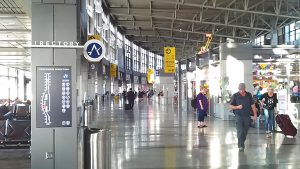Bloomberg
The Austin airport doesn’t have enough fuel for its flights, but plans to build new storage tanks are running into stiff opposition from neighbours in Texas’s booming capital.
For homeowners trying to preserve Austin in the face of exploding growth, the airport fight is the latest in a series of squabbles over the fate of the city. A major expansion of I-35, a new land development code and even the relocation of a downtown courthouse have spurred stiff opposition from some residents.
On one side of the airport dispute is the pro-growth camp, cheering on corporate relocations to the area including Tesla Inc and Oracle Corp as well as new multi-billion-dollar factories from the likes of Samsung Electronics Co More companies means more executives jetting in and out.
On the other side are nearby residents who charge that the airport didn’t do a sufficient environmental study to add massive new fuel tanks and want the plan stopped.
“That is simply not OK,†said Austin City Councilwoman Vanessa Fuentes, who has taken up the cause. She put forth a resolution that is up for vote to halt the plan. “Austin has a history of environmental injustices.â€
For some in East Austin, near the airport and traditionally home to more Hispanic and Black residents, the proposed project recalls a local petroleum tank that leaked for decades. The 1950s-era storage tank was found in the 1990s to have contaminated water and soil, leading to health issues for people nearby.
The fuel facility project, which received federal approval through an environmental study required by the National Environmental Policy Act, kick-started last summer after air travel resumed amid widespread Covid vaccination roll-outs. The project is part of the airport’s broader 20-year master plan which won approval from the FAA and City Council a couple years ago. The airport says the tanks are needed to cope with passenger traffic at the airport that’s expected to reach a record 20 million this year. Travel has surged as the metro area — home to 2.3 million people — became the nation’s fastest-growing in the decade ending in 2020.
The airport was forced to issue a fuel-shortage notice, advising airlines to fly in with extra supplies because the local stockpile wasn’t sufficient to refill them.
While the shortage didn’t cause any flight disruptions, it was the fourth low-fuel warning this year. Several fights had
to make unscheduled stops en route to Austin to refuel, according to Sam Haynes, a spokesperson for Austin-Bergstrom International Airport.
 The Gulf Time Newspaper One of the finest business newspapers in the UAE brought to you by our professional writers and editors.
The Gulf Time Newspaper One of the finest business newspapers in the UAE brought to you by our professional writers and editors.
